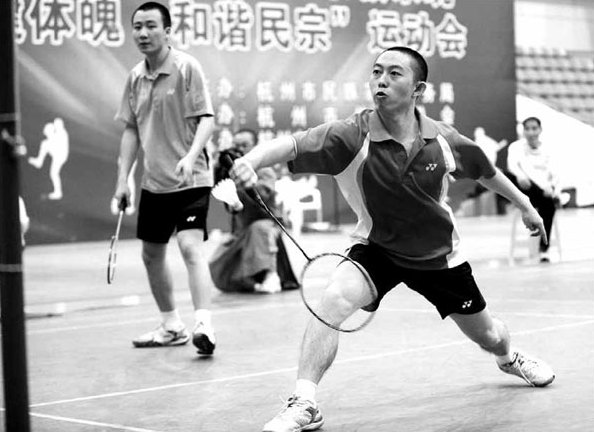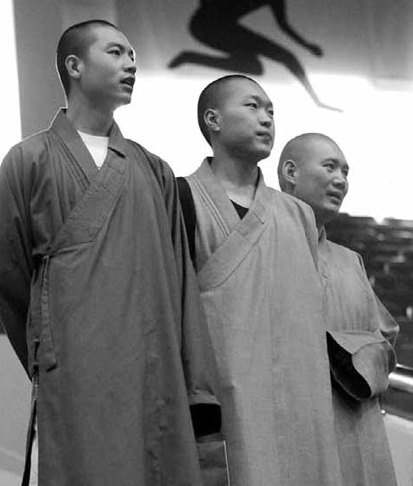Finding their Zen in sports
Updated: 2013-06-19 07:44
By Wu Ni (China Daily)
|
||||||||
|
Monks from Lingyin Temple in Hangzhou, Zhejiang province, are competitive badminton players. Photos by Li Zhong / For China Daily |
Monks of a famous temple say their enthusiasm for badminton is a natural part of their monastic life, Wu Ni reports in Hangzhou.
Tucked into a steep mountain, the 1,700-year-old Lingyin Temple in Hangzhou, Zhejiang province, has always been a major destination for pilgrims searching for spiritual tranquility.
But few know that the famed Buddhist shrine has the only formal badminton team in China's religious circles, whose monks have competed in matches and won prizes.
In April, a team of four monks from the temple ranked third in the preliminary round of a national badminton tournament. In the second round of the competition where they played with teams from other cities for the title of regional championship last weekend, they again came third.
Yan Kong, 31, captain of the badminton team, says that badminton has long been a popular game for the monks.
"Many are fond of the sport, so we set a field beside the Hall of Five Hundred Disciples as the playground in 2005. And in 2009, we built a standard badminton court on the field and formed the team," says the thin, medium-height monk.
With a glass ceiling and green rectangular floor, the temple's badminton court looks the same as any other gymnasium. Only the khaki walls, matching the look of most Chinese Buddhist temple walls, and the monks' gowns, give the setting some traces of Buddhism.
The team has more than 10 players who practice two to three times a week, normally one or two hours each time, after they have finished their daily routines, says Yan Kong.
The team's public debut was in 2011, when they joined the Hangzhou Badminton Club League and won third place.
"Many spectators were curious. Some said that monks should stay in the temple to study Zen (a school of Buddhism) and meditate, wondering why we appeared," recalls Yan Kong.
The monk says that playing badminton is one outlet for Zen meditation.
"Zen is ubiquitous in our life. If we do things with a heart of Zen, we are in an ashram no matter where we are," he says. "With the heart of Zen, we will not be bothered by our competitors, nor strongly pursue certain results, but will enjoy the process of playing badminton. That is a part of Zen meditation, which is not to achieve something, but to get our spirit purified during the process."
But most of their life is occupied by religion, the monk emphasizes.
Many of China's renowned badminton players have tutored the team, such as Chen Gang, a formal national team player who now coaches the national team of South Korea.
Li Xiang, secretary-general of the Hangzhou Badminton Association, is currently the team's coach.
"They called and earnestly invited me to tutor them," Li says. "They are passionate about the sport and very talented."
His daughter, Li-Wang Jingzi, became the partner of Yan Kong in the mixed doubles competition, as the team lacked a female player. "I feel they are easygoing and do not care much about success or failure," says the sophomore of Zhejiang University.
Badminton is not the only star sport of the temple. Zhi Zhong, the monk in charge of the temple's media, says that basketball and ping-pong are also embraced by monks. The temple hosts a weiqi, or go, contest every year and even sends monks abroad to show their skills with the 2,000-year-old Chinese board game.
"Physical practice is not contradictory with religious life," says Zhi Zhong.
For many monks, the passion for sports can be traced back to the time when they were young.
Yan Kong became a monk in 1998 and attended the Minnan Buddhist College in Xiamen of Fujian province. He recalls that many of his classmates would go to neighboring Xiamen University to play basketball, ping-pong or tennis. Later, the hobbies were naturally brought to temples.
"Maybe the life of monks has been thought to be mysterious or stereotyped as secluded meditation," he says. "Actually, we also participate in social activities."
In the past, when agriculture was the pillar of the social economy, Buddhist temples had farmland and monks had to feed themselves by doing strenuous farm work. Then, farm work played the same important role as Zen meditation, according to Yan Kong.
And that's why a founding father of Zen had a famous saying that carrying water, hauling firewood, eating and putting on clothing are all part of Zen for Buddhist monks.
Now, temples in cities do not need to cultivate farmland, so monks can turn to sports and social activities, which help to enrich their lives and their meditation, Yan Kong says.
Contact the writer at wuni@chinadaily.com.cn.
Jiang Yinan in Shanghai contributed to the story.
|
Monks from the temple cheer for their team during a national badminton tournament. |
(China Daily USA 06/19/2013 page9)

 Michelle lays roses at site along Berlin Wall
Michelle lays roses at site along Berlin Wall
 Historic space lecture in Tiangong-1 commences
Historic space lecture in Tiangong-1 commences
 'Sopranos' Star James Gandolfini dead at 51
'Sopranos' Star James Gandolfini dead at 51
 UN: Number of refugees hits 18-year high
UN: Number of refugees hits 18-year high
 Slide: Jet exercises from aircraft carrier
Slide: Jet exercises from aircraft carrier
 Talks establish fishery hotline
Talks establish fishery hotline
 Foreign buyers eye Chinese drones
Foreign buyers eye Chinese drones
 UN chief hails China's peacekeepers
UN chief hails China's peacekeepers
Most Viewed
Editor's Picks

|

|

|

|

|

|
Today's Top News
Shenzhou X astronaut gives lecture today
US told to reassess duties on Chinese paper
Chinese seek greater share of satellite market
Russia rejects Obama's nuke cut proposal
US immigration bill sees Senate breakthrough
Brazilian cities revoke fare hikes
Moody's warns on China's local govt debt
Air quality in major cities drops in May
US Weekly

|

|









